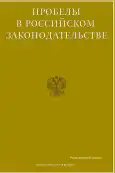О некоторых проблемах совершенствования уголовного законодательства Российской Федерации в отношении противодействия терроризму и экстремизму
- Авторы: Канокова Л.Ю.1
-
Учреждения:
- Северо-Кавказский институт повышения квалификации (филиал) Краснодарского университета МВД России
- Выпуск: Том 15, № 5 (2022)
- Страницы: 124-128
- Раздел: Статьи
- URL: https://journals.eco-vector.com/2072-3164/article/view/531614
- ID: 531614
Цитировать
Аннотация
Целью данного исследования является некоторые пробелы и недостатки уголовного законодательства Российской Федерации в отношении противодействия терроризму и экстремизму, обозначает проблему правильной квалификации некоторых преступлений, связанных с изучаемыми явлениями, а также применяемой терминологии. Задачи исследования состоят в необходимости пересмотра некоторых карающих мер, и ужесточения их именно по отношению к преступлениям террористического характера, указывается, на важность понимания разграничения некоторых близких на первый взгляд понятий, например, терроризм как более широкое понятие и террористический акт как одно из явлений терроризма, террористическое сообщество и террористическая организация, различать понятия экстремистская и террористическая деятельность, и самое главное четко различать явления экстремизма и терроризма, поскольку данные явления взаимно дополняют друг друга и как правило существуют одновременно. Выводы: Экстремизм является более широким понятием чем терроризм, его определяющим фактором является мотив, который может быть связан как с религиозными, так и с политическими аспектами. Главное определить мишень для розжига нетерпимости и розни. Поэтому существенным пробелом в законодательстве РФ является отсутствие классификации преступлений экстремистского характера и недостаточная дифференциация их составов. Поскольку терроризм и экстремизм - это два понятия, которые практически не встречаются одно без другого, то их взаимосвязь и взаимодополнение очевидно. Также обозначены проблемы квалификации преступлений. Здесь можно их выделить несколько. Так, вызывает споры вопрос о том, как квалифицировать преступление, отдельно по конкретным статьям или по их совокупности. В связи с этим, поднимается вопрос применения правильной судебной и следственной практики, поскольку, например, отнесение тех или иных организаций к числу экстремистских или террористических, вызывает волну протестов, как в случае признания экстремистской «Свидетелей Иеговы», и террористической «Хизб ут-Тахрир», представители которых до сих пор не признали законным решения суда, но тем не менее отбывают реальные сроки в заключении. Сложность в этом случае вызывает тот факт, что преступниками становятся все члены таких организаций, даже те, кто действительно, и в мыслях не держал занятие противоправной деятельностью.
Ключевые слова
Полный текст
Об авторах
Ляна Юрьевна Канокова
Северо-Кавказский институт повышения квалификации (филиал) Краснодарского университета МВД России
Email: kanokova91@mail.ru
майор полиции, преподаватель кафедры специально-технической подготовки Нальчик, КБР, Россия
Список литературы
- Ахильгов А.М. Ответственность за преступления экстремистской направленности // Молодой ученый. 2020. № 40 (330). С. 91-94.
- Аккаева Х.А. Некоторые размышления о противодействии терроризму как глобальной проблемы современности // Проблемы в Российском законодательстве.2020 №1. С. 145-146.
- Законодательство о противодействии экстремизму: требуется не либерализация, а модернизация URL: https://ngo.midural.ru/news/show/id/3098/news_category/120 (дата обращения 27.04.2022)
- Майстренко Г.А. Проблема разграничения понятий «терроризм» и «экстремизм» в законодательстве Российской Федерации // Государственная служба и кадры. 2019. №4. С. 132-135.
- Шамаев А.В., Гаужаева В.А. Особенности профилактики терроризма органами внутренних дел // В сборнике: Актуальные проблемы права и правоприменительной деятельности. Под общей редакцией В.А. Сосова. 2017. С. 147-153.
Дополнительные файлы








